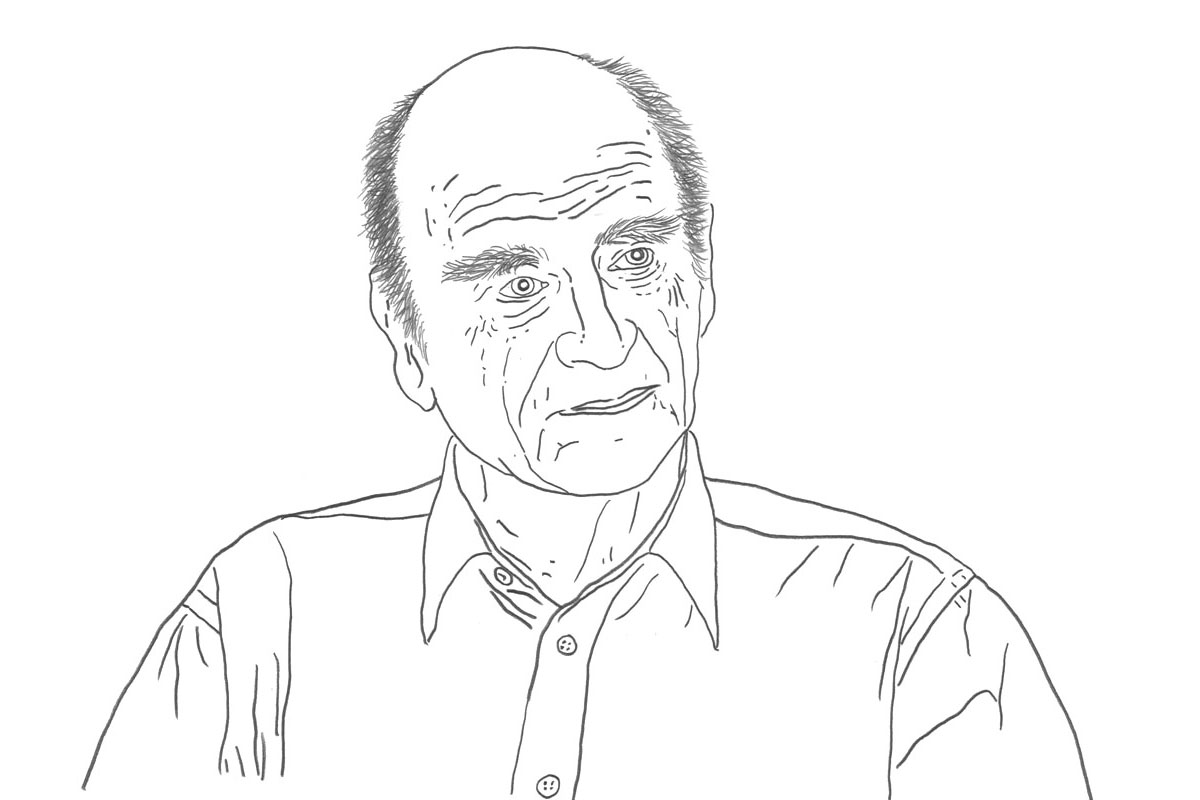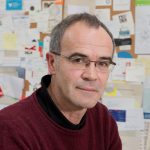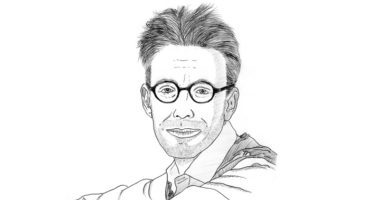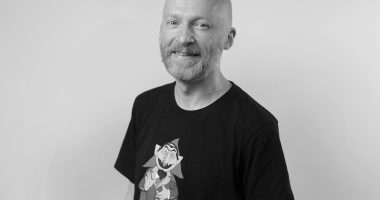
Michel Serres. Illustration by José Antonio Soria, CC-BY.
The work of Michel Serres is a magnificent journey through the scientific and humanist disciplines that shape our world. According to Serres, we are nearing the end of the era in which the concentration and density led to power, constituted knowledge and constructed the state, as well as social and individual life. Serres can discern a poetics of lightness emerging in an evolutionary landscape in which the convergence of flows is moving through the old deposits of a crystallised knowledge, giving rise to new, unpredictable phenomena. Through books like Northwest Passage (1980), the French philosopher and mathematician has sought the passage connecting the exact and human sciences, noting the difficulty of the endeavour due to the resistances and prejudices of both cultures. Serres is also one of the first European thinkers to propose the idea of a “natural contract” as a way of meeting the challenge of the environmental crisis we are in the midst of. And unlike some of his intellectuals who complain about the cognitive damage caused by new technologies, in Thumbelina (2014) Serres defends the “reversal of the presumption of incompetence” in digital natives, and predicts a reinvention of the ways in which we know and inhabit the world.
We interviewed Michel Serres on his visit to Barcelona to present his book Figuras del Pensamiento (Gedisa, 2016), a charming and rigorous intellectual autobiography that sums up the adventure of thinking: in other words, of “seeing big”. To think is to invent, says Serres. Everything else can be considered preparation, but you soon fall into repetition, plagiarism, and servitude. It’s better to forget that domination, that format, and to make it lighter, innovate.
The transcript of the interview
I began studying mathematics and physics, that is, exact sciences, and I was preparing to enrol in a science faculty. I must say that my generation was marked by the end of the war and Hiroshima, events relating to the atomic bomb. So, aware of these problems, I abandoned the science degree and decided on a humanities degree. I enrolled in literary studies. In other words, I crossed the Northwest passage. I was familiar with the issue, so I decided to study it. It’s a shame that philosophers of my generation know little about the sciences, so they can’t be totally lucid about the contemporary world. To be lucid about the contemporary world… What I mean is… to understand that it was about, first and foremost, a revolution in communications: I wrote Hermes. Many books are entitled “Hermes”, the God of communication.
Then I wrote The Natural Contract, on ecology, where I tried to be as lucid as possible about anticipating what may happen. And old books show that it really is like this. In fact, my life has revolved around this dual culture. It is the only culture that allows us to understand what’s happening in the world, and to try to anticipate the future.
“I am seeking the path way between exact sciences and human sciences. (…) Between us and the world. It is not an easy path, as the classification of knowledge suggests: I consider it as arduous as the Northwest passage.”The Northwest Passage. Michel Serres
The Northwest Passage was the title of an essay in which I made a kind of connection between the human sciences and exact sciences. I had spent a long time teaching around the world, and noticed that universities – from the very beginning – separate human sciences and exact sciences. The result of this approach to education is cultured people who are ignorant of science and scientific people who are not cultured. Particularly in the case of political leaders, civil servants, politicians, etc. They studied human sciences but exact sciences are the cause of all the changes in today’s world. Consequently, there is an increasingly large gap between society – shaped by exact sciences – and politics – educated in human sciences -. This means we do not cross the Northwest passage. That’s one of the big problems of the contemporary world. It probably explains, to a large extent, the problems and crises we suffer today.
“A change is starting to take place that favours symmetrical circulation between qualifiers and qualified, elites and subjects – a certain reciprocity.”Thumbelina. Michel Serres
This is a remarkable time because one of the main engines for the evolution of knowledge is new technologies. That’s why I wrote a book entitled Thumbelina. This Thumbelina has clearly changed human and professional relations, and it is even changing the sciences. But the human sciences haven’t absorbed it yet, they haven’t understood it. Once again, the two groups – one trained in human sciences, the other in exact sciences – are totally separate and it’s becoming dangerous to have this split between the two groups. That’s the difference. Today… the difference between political obsolescence, on one hand, and social evolution on the other, is largely based on this gap.
“Given these changes, there is an unquestionable need to invent unimaginable innovations, beyond the obsolete frameworks that still format our behaviour.”Thumbelina. Michel Serres
And indeed, the arrival of Thumbelina, or new technologies, has disrupted habits and obviously the group, or the generation, that is used to books, to writing, has found it hard to adapt to the developments that new technologies offer. But it is not about of young and old, by any means. Only the Americans think it’s a generational issue, a generational struggle. But many older people have adapted to the internet and many young people haven’t. It’s more about a transformation of culture. For better or for worse? It’s hard to think in those terms, because generally speaking, When a new technology appears, the results we obtain depend on our own freedom. But what I can say is that new technologies offer considerable access to information, access to other professions, to other intermediaries, and to many people, so, mobile phone in hand, we control many things. We have access to… Obviously, pessimists say: “it’s information” and they’re right. Information is not wisdom. Information is not knowledge, so it’s always necessary to have some kind of teacher to explain the information and transform it into knowledge. This affects the pedagogic issue.
“I could speak to you from my place or elsewhere, and you could hear me from home or anywhere. So what are we doing here?”Thumbelina. Michel Serres
But it will end up affecting all professions, and transforming them it will certainly transform political divisions. It is obviously a question of pedagogy, of the teacher-student relationship. And that is often a relationship of power, of the teacher over the student. New technologies rebalance this relationship. So, when I’m in class, when I walk into a classroom… In the past, students couldn’t foresee what I would tell them. But now, my students can find the syllabus online. And sometimes I hear them say: “Oh, he’s right, I checked.” There’s a new kind of balance between those who teach and those who are taught. This loss of power is not bad. A teacher is a bearer of knowledge, not power. Firstly, power is not knowledge. Secondly, I think that the teacher always plays an important role because, as I said, the net gives access to information but not to knowledge. For example, the two, three, four of us… absolutely want to know all about the science of atoms. We have all the information but we understand nothing. We need somebody to explain it, we always need somebody to lead us from information to knowledge.
“We have become global actors. Does the earth, in turn, respond to our actions? Combat, dialogue, or agreement? Under the threat of a fight to the death, we have to establish a contract.”The Natural Contract. Michel Serres
Firstly, the problems of climate change have little to do with new technologies. Thumbelina is not responsible for climate change. The problem is twofold. Firstly, it’s an economic issue: the industrial revolution of the 18th-19th centuries brought us today’s civilisation, with its familiar comforts but at the expense of the devastating destruction of the planet. We need to transform the 19th century industrial revolution into a new industrial revolution, a new revolution that isn’t based on exact sciences like thermodynamics, energy sciences, and nuclear sciences, but on life sciences and earth sciences. Life and earth sciences have already warned of the dangers we are facing… Well then, am I an optimist or pessimist on this matter? I think pessimism is pointless. The interest aroused by pessimism sells a lot of books. I mean, everyone appreciates criticism. As for optimism, I would call it “combat optimism”. I think it’s essential to work towards a planet where future generations can live at least as well as we do, and perhaps even better. So we have to work on it.
At the same time, Thumbelina’s generation is not like mine, things have changed a lot… The environmental awareness of today’s youth is very lucid, very pertinent and alert to all these problems. Much more alert than mine or my parents’ were. So there are two reasons for optimism. Firstly, the work – we have to get going on this. We have to work and fight. Secondly, I truly believe that the new generation, which I call Thumbelina, is very sensible on environmental issues and much more sensitive than ours was.



Samuel Vargas Nates | 03 June 2019
Me ha parecido muy interesante lo que piensas sobre las ciencias exactas y las humanas y la diferencia entre ellas. También me parece muy interesante la manera en la que llamas a la tecnología “pulgarcita” y tú definición sobre ella.
Me parece interesante como describes a las nuevas generaciones. Pido el favor de que si hay artículos similares a este por favor mandarlo a mi correo.
Leave a comment